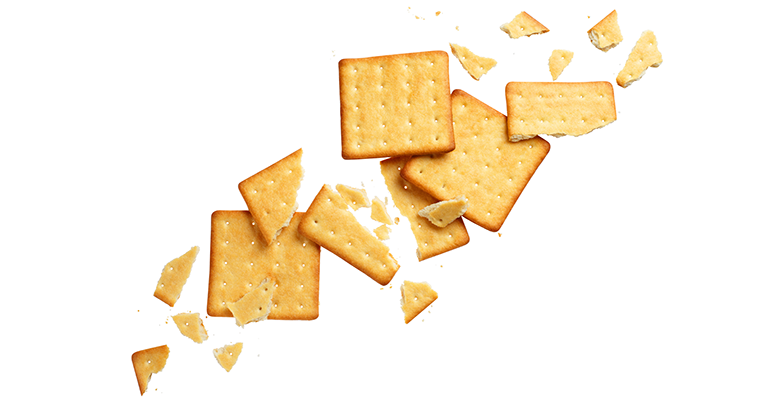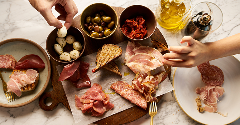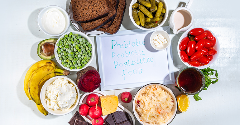News
Crunch time: Asian biscuit and cookie innovation offers success
30 Sep 2022
Consumer interest in healthy eating and clean label is shaping new product development in Asia for healthy but indulgent baked goods.
It’s a tough balancing act though. The shift towards clean label, organic and better-for-you snack products is often in conflict with consumer sentiment, which views biscuit and cookies as comfort food.
The Asian/Asia-Pacific (APAC) biscuit and cookie market has seen a wave of innovation in recent years, lifted by brands adding better-for-you ingredients to their baked offerings.

“Adding fruit and vegetables to cookies and crackers strikes a chord with consumers,” according to Mikolaj Kaczorowski, innovation analyst at Mintel. “The global pandemic has intensified the importance of maintaining a healthy diet, with a significant proportion of adults in Asia trying to incorporate more nutritious foods in their diets.”
With health halos resonating with consumers, brands are keen to emphasise the real fruit and vegetable content contained in snacks.
Clean label and healthy: Vegetable biscuits and lily seed snacks
Singapore startup Zenko Superfoods has recently unveiled plans to distribute its healthy snacks into Australia and South East Asia, including its flagship water lily pops.
First launched in late 2019 in specialty stores, its water lily-seed based products contain few ingredients; the original flavour only contains water lily seeds and olive oil.
Meanwhile China-based Wingoo Anime Foods launched a biscuit that contains nine vegetables, including white sesame, carrot pieces, broccoli, spinach, cabbage, pak choy, lettuce, green pepper, and tomato.
In a similar vein, Thailand’s Bite Me, launched dried yoghurt smoothie made with real yoghurt and fruit. The biscuits contain zero fat and are low in calories.
The shift in the region’s snacking habits has not gone unnoticed by the big corporations with Kraft Heinz rolling out an Oreo-lookalike biscuit with fillings such as matcha tea and chilli.
Nuts, seeds, and kernels are popular inclusions
According to Mintel’s Global New Products Database (GNPD) between March 2017 to February 2022, nuts, seeds, and kernels are the most popular addition to cookies, while for crackers it’s vegetables.
“Ingredients like immune-boosting cauliflower is incorporated into cookies and crackers to make them more nutrient-rich with a neutral-tasting vegetable that appeals to health-conscious consumers concerned about healthy snacking,” says flavour and fragrance producer Symrise.
“Brands prominently promote these ingredients with health benefits and find the line between making something indulgent and beneficial.”
Indeed, Mintel believes interest in healthy biscuits becomes particularly evident among older consumers.
The analyst’s research found that some 31% of adults in Thailand over the age of 45 are interested in biscuits containing vegetable pieces and 28% interested in recipes with superfood ingredients.
 © AdobeStock/Yeti Studio
© AdobeStock/Yeti Studio
A review of ingredients
But as much as including ingredients that fit into consumer lifestyles, innovation is as much as excluding certain ingredients from popular products while maintaining taste, appearance, and shelf-life.
Creative innovations have seen the use of natural colourings, flavourings and sweeteners, as seen in the increased use of stevia.
The Australian and New Zealand region is a fine example of this, with Melbourne-based brand The No Nasties Project, launching its Better Cookies range earlier this year.
Featuring three flavours – Hazelnut Flavoured Choc Chip Minis, Choc Chip Minis and Caramel Flavoured Minis, the range uses stevia as its sugar alternative, resulting in an 80% reduction in sugar compared to market-leading variants. The range are also free from artificial colours and flavours.
“Our BETTER Cookies want to shake up the proverbial cookie jar, allowing people to enjoy their cookie moments guilt free” says CEO and Founder David Andrew.
“We are proud to be offering Australians an ever-increasing range of healthier alternatives to their important daily moments and rituals. Being health conscious shouldn’t be about missing out.” says Andrew.
Other snack makers have gone down a renovation route, introducing gluten-free variants of its most popular biscuits.
That’s certainly the case for Australia's largest producer of biscuits Arnott’s. Its recent launch of gluten-free Scotch Finger, Choc Ripple and Tiny Teddy is according to the brand an attempt to tap into the estimated 6 million (25%) of Australians who avoid gluten.
“Many of those people have traditionally felt disappointed by the available offering, with as many as two thirds believing that the existing Gluten Free snacks don’t taste nearly as good as regular snacks, according to a study undertaken inhouse,” says Arnott’s Group nutritionist, Alison Baldwin.”
“Our teams have created biscuits that meet the strict requirements of the Coeliac Australia endorsement program, meaning all products will feature the Coeliac Australia Endorsement logo.”
Kaczorowski says the launch from Arnott's heralds the brand's entry into the gluten-free biscuit and cookie market, to date a market primarily served by more niche, health-orientated brands.
Gluten-free claims in biscuit, cookie and cracker NPD in Australia and New Zealand has remained steady at around 15% of NPD over the last five years and is on par with the level seen in the broader bakery category in the region.
Arnott’s continue this theme with its Cracked Pepper & Thyme Crisps, which are made with a real sourdough starter and are free from artificial colours, flavours or preservatives.
Meanwhile, Mondelez’s decision to purchase Australia’s Gourmet Food back in March 2021, added healthier cracker brands such as Olina’s Bakehouse, OB Finest and Gullon.
Olina’s Bakehouse and OB Finest produce premium crackers with ingredients such as nuts, seeds and fruits and Gullon has built up a following with its no sugar added or sugar-free products.
Most of the Gourmet Food brands are present in both Australia and New Zealand, and several such as Gullon and OB Finest are available in foreign markets such as Singapore and Malaysia.
Related news

Oat Barista: Innovation for game-changing beverages
20 Nov 2025
Oat Barista is a clean label, sustainable, and innovative drink base specifically designed to create the perfect foam in one single ingredient.
Read more
Nitrites: Pressure grows on UK to follow EU’s lead
20 Nov 2025
Pressure is growing on the UK to follow the EU’s lead after the bloc revised its regulations on the permitted levels of nitrites and nitrates in cured meats.
Read more
Empowering innovation in fortification and colouration
13 Nov 2025
Divi’s Nutraceuticals offers a large portfolio of innovative, high-quality ingredients for foods, beverages, and supplements, with bespoke solutions and expert support for product success.
Read more
Danone highlights digestive health as potential ‘tipping point’ for food industry
13 Nov 2025
Danone is betting on a food industry “tipping point” that will bloat the market for healthy products, particularly those related to gut health.
Read more
Standing Ovation and Bel scale up casein production from dairy co-products
11 Nov 2025
Foodtech company Standing Ovation has partnered with cheese specialist Bel Group to manufacture dairy serums for industrial-scale casein production via precision fermentation.
Read more
AI attraction means foodtech startups must ‘prove’ rather than ‘promise’
4 Nov 2025
Reports suggest that artificial intelligence (AI) is sucking investment from foodtech and agritech, but investors say the picture is complicated.
Read more
Will postbiotics become the go-to functional ingredient?
3 Nov 2025
Postbiotics show significant promise for the functional foods market due to their safety profile and beneficial bioactive properties, research suggests.
Read more
Meet the finalists of the Fi Europe Innovation Awards 2025
31 Oct 2025
Who made it to the shortlist of the Fi Europe Innovation Awards 2025? Read about the 23 companies making food and drink products healthier and manufacturing processes more efficient.
Read more
Penguin and Club bars no longer classed as chocolate
30 Oct 2025
Penguin and Club bars can no longer be classified as chocolate after the pladis-owned McVitie’s brands turned to cheaper alternatives amid the ongoing cocoa crisis.
Read more
Shorter drying time, sweeter success!
30 Oct 2025
Curious about cost-effective, sustainable and delicious candy making? Stefan Wessel reveals how Avebe’s solutions reduce drying time and energy use by up to 50%.
Read more